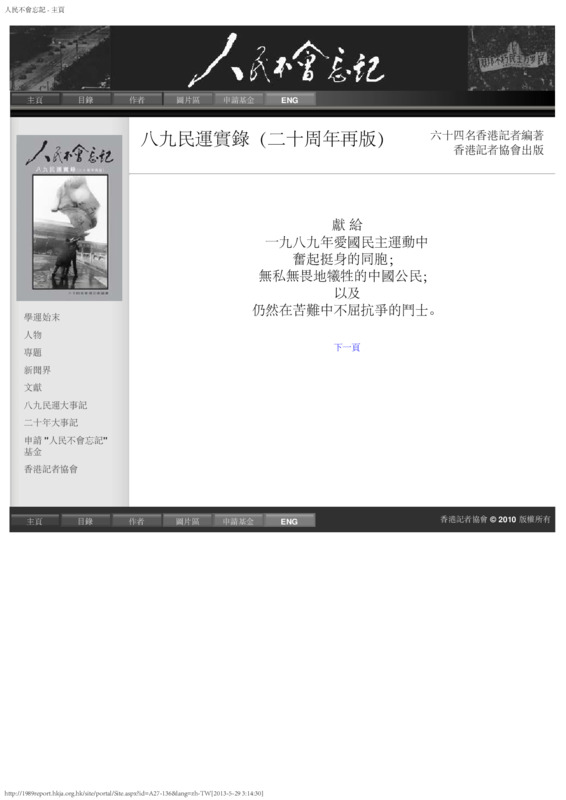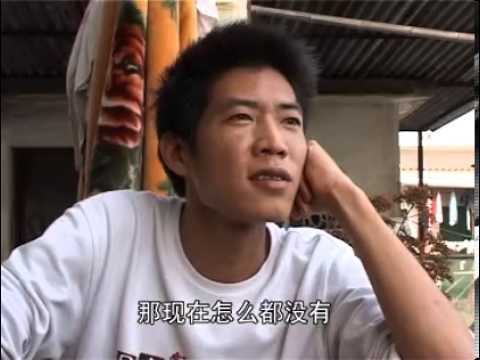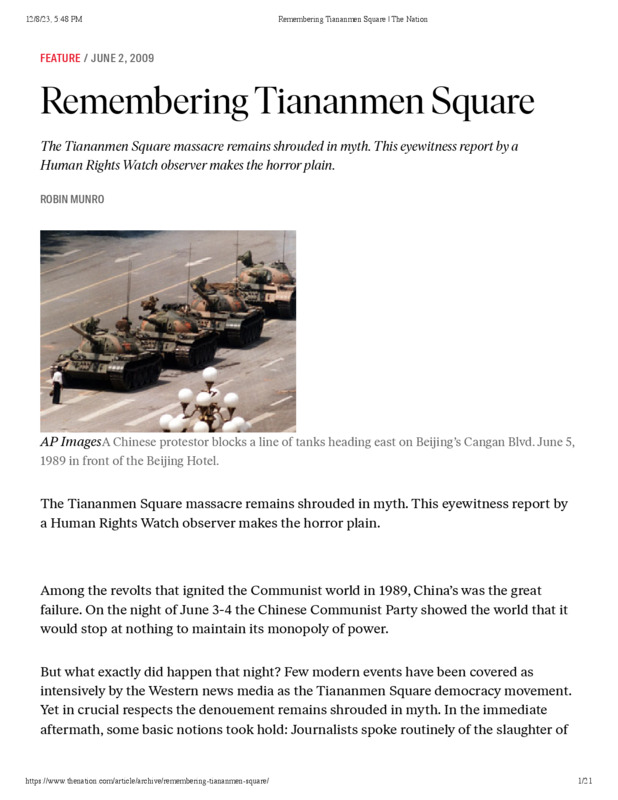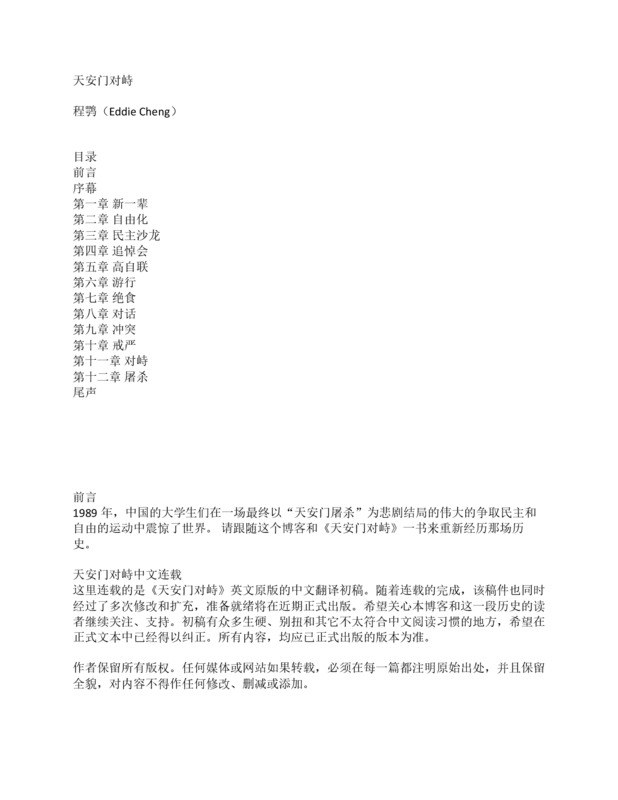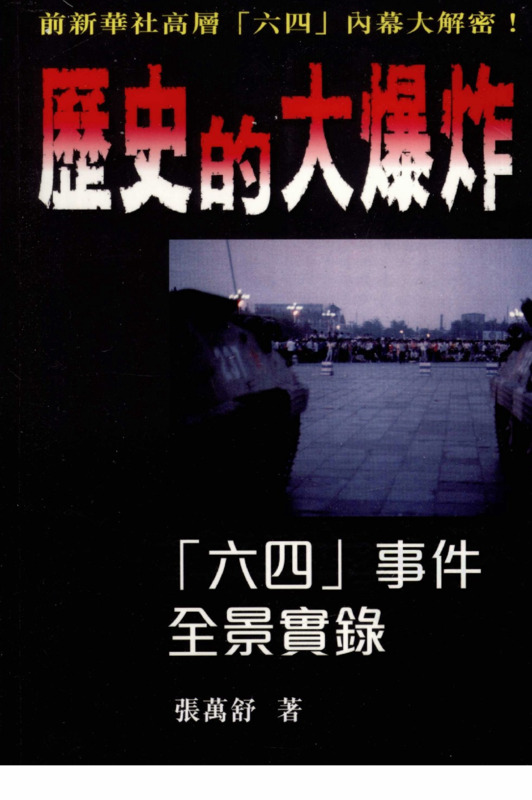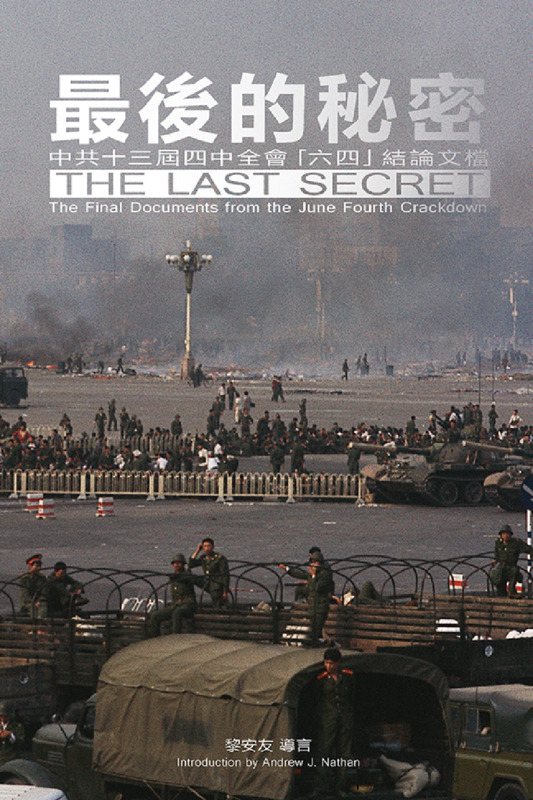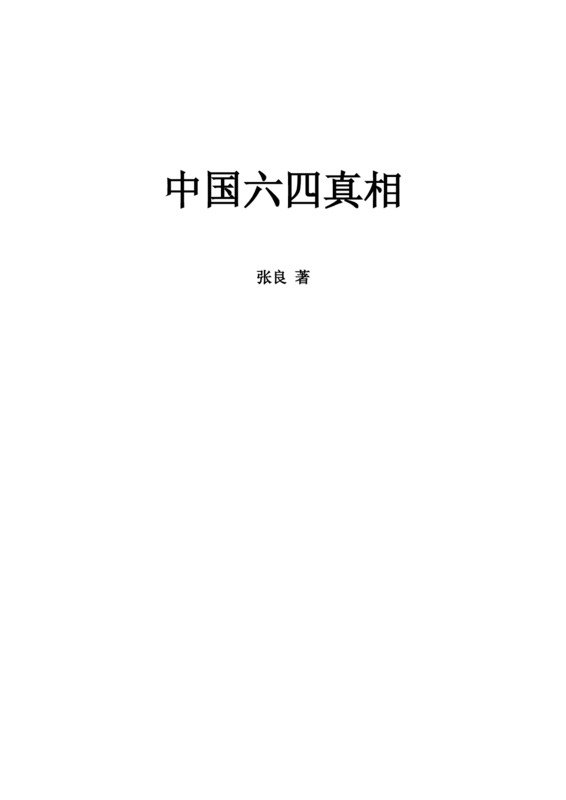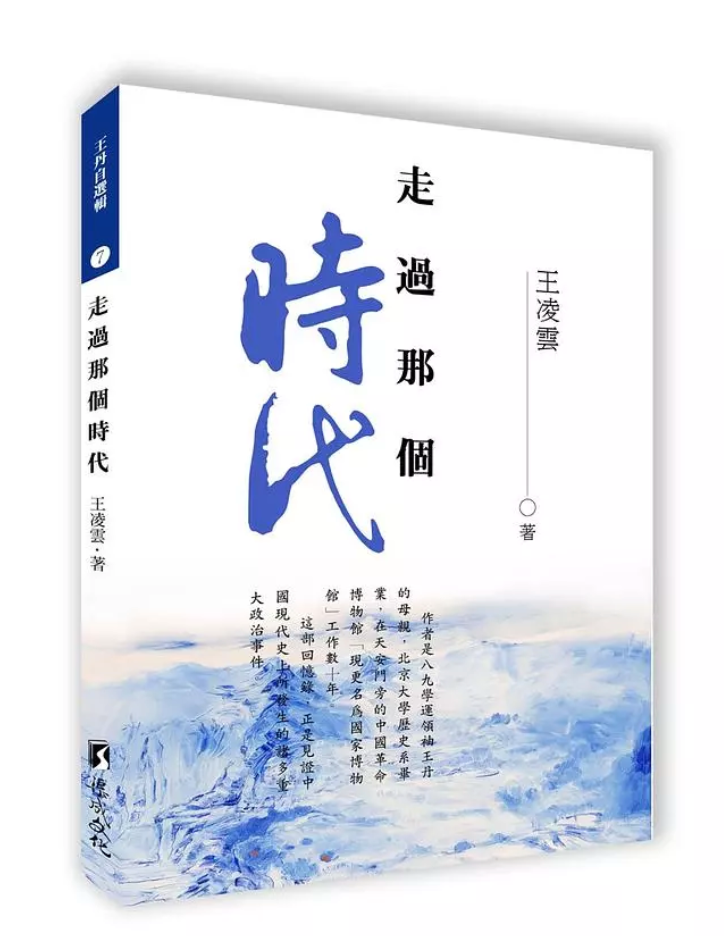Explore the collection
Showing 35 items in the collection
35 items
Book
People Will Not Forget:A Chronicle by 64 Hong Kong Reporters
This book published by the Hong Kong Journalists Association, summarizes the June 4 reports of dozens of journalists. The first edition was released in July 1989, and was reprinted on the 20th anniversary of June Fourth.
Film and Video
People’s Representative Yao Lifa
Yao Lifa, a teacher from Hubei, was an independent candidate for the 2003 General Election of Deputies to the National People’s Congress. This documentary records the process in which Yao publicized and educated the public on election laws, and his experience with the grassroot electoral campaign. This documentary also reflects the budding grassroot awareness of civil rights in China through voices from the media and ordinary people.
This film is in Chinese with Chinese subtitles.
Book
Remembering Tiananmen Square
The author was a Hong Kong-based observer for the international human rights organization Human Rights Watch. Remembering Tiananmen is a long article first published in The Nationmagazine in November 1990. It was written after witnessing the crackdown around the square during the night of June 3 until 4 a.m. the next morning.
Book
Rethinking China's Democracy Movement
Author Hu Ping was involved in the Xidan Democracy Wall movement in the late 1970s and now lives in the United States.
He has successively chaired the pro-democracy publications <i>China Spring</i> and <i>Beijing Spring</i>. This book, published in 1992, analyzes the reasons for the failure of the June Fourth Movement and summarizes the lessons learned. The last two chapters suggest how to continue the pro-democracy movement in the future.
Book
Stand off at Tiananmen
This book goes beyond the individual perspective of a memoir to recount the movement from the perspective of the student collective. It focuses on the vivid portrayal of characters and their interactions. As the author puts it, this is the first time that the 1989 pro-democracy movement and the June 4 tragedy are "recounted as a complete and coherent attempt at narrative history." This book was originally written in English and published in 2009 on the 20th anniversary of June Fourth. The author himself later translated it into Chinese and released it on the eve of June 4 this year. The author, Eddie Cheng, was originally a student in the Physics Department of Peking University in the class of '80. He caught up with the election campaign right after he entered the school. Later, he became an important organizer of the student movement, having spearheaded the two campus pro-democracy campaigns of '84 and '85. In 1986, he went to the United States to study abroad. Currently he resides in the US state of Colorado.
The book can be purchased <a href="https://www.amazon.com/dp/0982320302">here</a>.
Film and Video
Taishi Village
In the fall of 2005, residents of Taishi Village became increasingly frustrated and angered by the sale of land by village officials; hundreds of villagers signed a petition calling for the removal of the village chief. The villagers occupied the village committee’s financial office and expressed their demands through sit-ins and other forms of protests. The government dispatched the police to arrest village activists, but the villagers insisted on starting a formal recall process. The government finally sent a team to the village to verify the signatures for the petition.
<i>The Taishi Village</i> recall incident generated attention from Chinese and foreign media, and caused uneasiness among local government officials. On September 12, 2005, police arrested dozens of villagers who were participating in a sit-in in the village committee room. Despite the pressure, villagers elected a committee to remove the village committee director. The government then dispatched more men to exert pressure, forcing elected members to withdraw one by one. Hired patrol teams eventually drove lawyers and reporters out of the village.
This documentary records the protest scenes and tragic ending of Taishi village’s movement for autonomy, and presents the surging rights consciousness in rural areas in Guangdong. This incident demonstrates villagers’ ability to exercise their right to vote and the government’s inertial approach to grassroots democracy movements.
This documentary is in Chinese with Chinese subtitles.
Book
The Big Bang of History:June Fourth Movement Record
This book was published in Hong Kong in 2009, on the eve of the 20th anniversary of June Fourth. The author, Zhang Wanshu, was the Director of the Domestic News Department of Xinhua News Agency during the June Fourth Incident. This book provides a historical account of the June 4 incident from the unique perspective of the official media, including a lot of insider information. Famous journalist Yang Jijian commented that the book's historical authenticity is beyond doubt, and that it is an indispensable historical document for the study of the June Fourth Incident. In the form of daily events, the book records the situation from April 14th to June 10th, 1989—including the mobilization of 10 armies by the Central Military Commission from the five major military regions, their march to Tiananmen Square along six routes, and the army's entry into the city in disguise, etc. Of particular interest is Zhang Wanshu's citation of Tan Yunhe, then party secretary of the Red Cross Society of China, who said that there were 727 deaths in the June 4 incident—including 713 students and mass deaths and 14 military deaths. This figure is far from the 2,700 recorded by the Red Cross Society of China and has led to much controversy.
Book
The Goddess of Freedom of the Chinese Nation -- An Anthology of Essays in Honor of Lin Zhao 40 Years After Her Death
Lin Zhao, formerly known as Peng Lingzhao, a native of Suzhou, was admitted to the journalism department of Peking University in 1954, but was classified as a Rightist in 1957. She was arrested and imprisoned in October 1960 because of her involvement with the underground magazine <i>Spark</i>. In 1965, Lin Zhao was sentenced to 20 years' imprisonment for "counter-revolutionary crimes." On April 29, 1968, she was sentenced to death and executed on the same day at the age of 36. This book is a collection of more than sixty articles written in memory of Lin Zhao.
Book
The Last Secret : The Final Documents from the June Fourth Crackdown, Introduction by Andrew J. Nathan
The documents in this book come from two high-level meetings of the CCP held after the June 4 Tiananmen Square Incident in 1989, namely, the Sixth Plenary Session of the Sixth Committee of the Beijing Municipal Committee of the CCP and the Fourth Plenary Session of the Thirteenth Central Committee of the Chinese Communist Party (CCP), which was held on June 23rd and 24th at the Beijing West Guest House. The author claims that the documents were copied and kept for many years by an unnamed senior official within the CCP. This set of documents was formed when the CCP made its final conclusions on the June 4 incident. It is also a record of the high-level political operations within the CCP. These documents reveal the ultimate secret of the mechanism by which the Communist Party has always held absolute power. It was published by New Century Press in 2019. Special thanks to Bao Pu, founder of Hong Kong's New Century Press and son of Bao Tong, former political secretary of Zhao Ziyang, for authorizing CUA to share the book.
Book
The Power of Tiananmen:State-Society Relations and the 1989 Beijing Student Movement
<i>The Power of Tiananmen: State-Society Relations and the 1989 Beijing Student Movement</i> is a sociological monograph. It explains the process of the 1989 school movement and interprets the political and economic situation from four perspectives: state legitimacy, ecological environment and mobilization structure, discourse and modes of action, and public opinion. Author Zhao Dingxin interviewed 70 participants in the movement at the time. He also examined many little-known domestic documents. Thus, theory and evidence are closely intertwined.
The book won the 2002 Distinguished Book Award (Collective Action/Social Movements) and the 2001 Distinguished Book Award (Asian and Asian American) from the American Sociological Association.
It is published by the Chinese University of Hong Kong Press.
Book
The Tiananmen Papers/The Truth about June Fourth in China
<i>The Tiananmen Papers </i> is an English-language book based on internal government files on the June 4 incident in China. It was provided by a person under the pseudonym Zhang Liang, translated by Prof. Perry Lin, edited by Prof. Lai An-You, and with a conclusion by Prof. Xia Wei, Dean of the Berkeley School of Journalism. The book was published in January 2001 by the American Public Affairs Press. <i>The Truth about June Fourth in China </i> is the Chinese version of <i>The Tiananmen Papers </i>, published on April 15, 2001 by Der Spiegel Publishing House. The Chinese version retains the deleted contents of the English version and is three times as long as the English version.
Film and Video
Three Days in Wukan
Wukan is a village in Luwei City, under the jurisdiction of Shanwei City, Guangdong Province. From 2011 to 2016, Wukan villagers have continued to fight to protect their land and fight for villagers' rights. Facing strong pressure from the government, some even paid with their lives. In the process, the villagers had elected their own villagers' committee by one person, one vote to practice their democratic rights. Although the protests were eventually suppressed, the impact was far-reaching. Ai Xiaoming rushed to the scene at the beginning of the Wukan incident and left this precious record.
Book
Walking Through That Era
The author of this book, Ms. Wang Lingyun, is the mother of Wang Dan, a student leader of the June Fourth Movement. She graduated from the History Department of Peking University and worked at the National Museum next to Tiananmen Square for decades. This memoir, published in Taiwan in 2021, is an account of the major events in modern Chinese history, including the 1989 Tiananmen Square democracy movemen.
This is the link to purchase the book:
https://www.eslite.com/product/1001273162681985770003
Book
Wang Dan's Memoirs: From June 4 to Exile
Written by Wang Dan, a leader of the June Fourth Movement, this book reviews his diary from childhood to adulthood, and examines every twist and turn in his life. Influenced by a book in high school, Wang Dan strongly questioned his faith in the Communist Party. His life changed dramatically when he became a propagandist for democracy on the campus of Peking University. Later, he became one of the leaders of the 1989 student movement.
Film and Video
Xu Zhiyong
Chinese human rights activist Dr. Xu Zhiyong, twice imprisoned for his longstanding advocacy of civil society in China, was sentenced to 14 years in prison by the Chinese government in April 2023. The documentary by independent director Lao Hu Miao was filmed over a four-year period, beginning with the seizure of the Public League Legal Research Center, which Xu Zhiyong helped found in 2009, and ending with Xu's first prison sentence in 2014.
